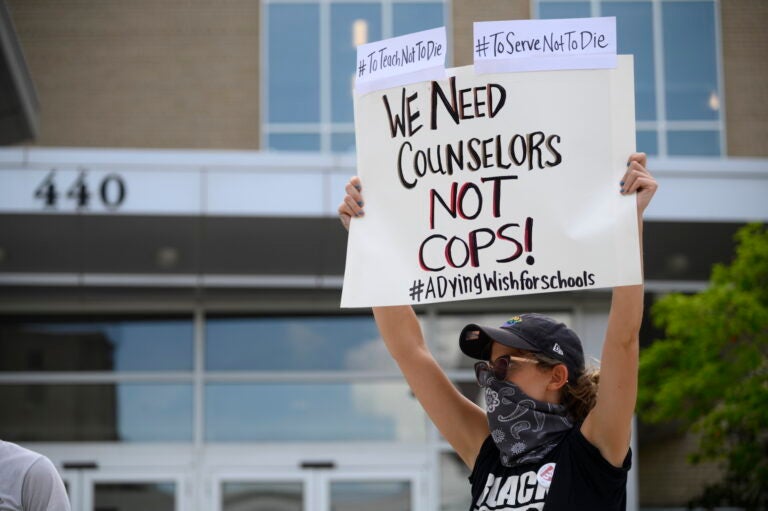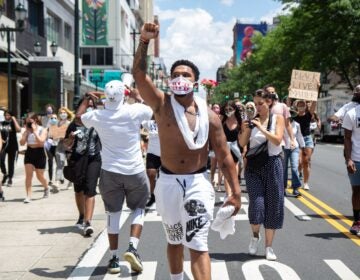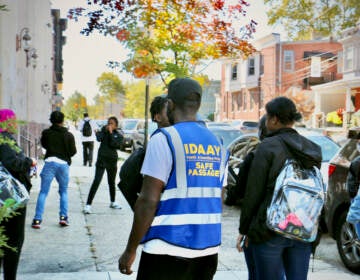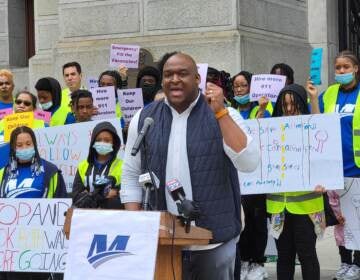Philly school board hearing report: speakers seek fewer police, more support services
Students and community members are calling for counselors, programs, and classroom staff — not more security.

Teachers and students rallied outside of the School District of Philadelphia Headquarters calling to eliminate asbestos in school buildings. (Bastiaan Slabbers for WHYY)
This article originally appeared on The Notebook.
—
Teachers, counselors, parents, and national activists added their voices to students’ call for “police-free schools” at a general public hearing held by Philadelphia’s Board of Education on Thursday.
The board holds two of these hearings annually, as the City Charter mandates; the only agenda for the meetings is to hear speakers.
At the hearing and at a virtual “rally” held during the hour before, members of the Philadelphia Student Union and their allies repeatedly said that reform of the District’s 350-plus-member school security staff was not enough. Speakers called for the “radical step” of removing school police and redirecting funds to counseling and social services personnel.
“It’s time to reimagine safety in schools without policing,” said Saudia Durrant, an organizer with PSU. She and others urged the District to “stand up against institutional racism,” pointing to statistics showing that school police are more likely to be in schools with more Black and brown students, who are disproportionately disciplined across the country.
“Please, please, please, look at the research, look at the statistics, and you’ll find that they align perfectly with the experiences of your students and that police do not belong in our schools,” said Masterman senior and PSU member Aden Gonzales. “With the current amount of money spent on police, we could hire over 500 guidance counselors.”
Some spoke of indignities they suffered at the hands of school police. Allison Fortenbery, a rising senior at Masterman, recalled being stopped and searched with a long line of people waiting behind her at a metal detector because the officer thought an outline in her backpack was a prohibited e-cigarette.
“It was a portable charger,” Fortenbery said. “School police don’t look at us like students. They look at us like criminals. Police officers have no place in schools.”
A PSU petition calling for replacing the security force with community members trained in trauma care and restorative justice had more than 12,000 signatures by Friday morning.
Trauma-informed approach
Philadelphia’s school security is now under the direction of former Deputy Police Commissioner Kevin Bethel, who is nationally known for his efforts to change how police deal with young people – away from arrest and punishment and toward trauma-informed and nurturing interventions. Bethel has promised to retrain existing officers and hire new ones who believe in his approach.
The officers, who are no longer called school police but instead school security officers, do not carry guns. The cost of the security force is more than $31 million.
Bethel said he is eager to sit down with PSU to discuss their concerns. While he was still on the city police force, he started a diversion program that has reduced school-based arrests by 80%.
The fervor of the speakers at the hearing “reaffirms the importance of allowing individuals to have a voice in the process,” he said in a text message after the hearing. “You cannot deny the energy and passion they brought to the conversation this evening. I think it is great, and I am hopeful we can turn these conversations into a productive collaboration.”
He has already met with another organization, UrbEd Inc., co-founded by 2018 Science Leadership Academy graduate and student activist Tamir Harper.
“We have to start removing police officers from our schools,” Harper told the board. “We can’t chant ‘Black Lives Matter,’ we can’t chant ‘no justice, no peace’ and not ensure that Black schools matter and Black children matter when they enter the buildings they’re going to in their neighborhoods.”
Metal detector policy
Harper also called on the board to abandon Policy 805, which makes the use of metal detectors mandatory in all District high schools. The board is getting ready to revise the policy at its meeting next week, at Bethel’s urging, to make the experience less stressful for students. Bethel is retraining officers to be friendlier and more respectful and will be posting signs to let students know exactly what objects and substances they are not permitted to carry into schools.
But Harper told board members: “You have the power to really remove metal detectors and look at reallocating the funding.”
Both Bethel and Board President Joyce Wilkerson have pointed out that removing metal detectors is not a simple matter, because although PSU and other advocates say they create a prison-like atmosphere, many parents and students say they feel that the detectors keep schools safer.
At the hearing, several adults who work in schools also backed the students’ position. Eighth-grade teacher Chelsea Maher said that having police in school is “hypocritical.”
“Police presence in school does nothing more than feed the prison industrial complex through the school-to-prison pipeline,” she said. “You’d rather support a racist system than reimagine school safety.”
More should be spent on “community-building and mental health services,” she said. “Police officers in schools only instill fear in a majority of our students, which limits their learning.”
Charlie McGeehan, a teacher at the U School, said, “It’s time to take up PSU’s calls to remove school police.”
Teacher Eric Moran took a position closer to what Bethel is doing with school security. “We need to reevaluate the structure and function of our school police officers,” he said. “While there are some great people doing this work who … mentor and work with our youth outside of the school day, they’re also bound by protocols and directives that inhibit their autonomy when a serious incident occurs. Instead, they need to be re-imagined as a de-escalation force to help our young people and nurture them rather than punish them.”
Annike Sprow, a social worker with Lakeside Institute, has worked in city schools to train teachers in trauma’s effects on the brain. She said, “The mere presence of police in schools has a negative impact on healthy brain function in students who are Black and brown and have to deal with the chronic stress of living in overpoliced neighborhoods. … It’s impossible to become a truly trauma-informed district without the removal of school police.”
Activists who have led successful de-policing efforts in Toronto and elsewhere also addressed the board.
Jessica Alacantara, an attorney with the Advancement Project, a civil rights organization based in Washington, D.C., said her organization works “all across the country and found the same thing to be true: There is no evidence that police in schools make children safe.”
Instead, she said, they need “the supports already proven to improve school climate, like counselors, social workers, conflict de-escalators, behavioral specialists, and restorative justice practitioners.”
Eyes on September
Beyond policing, students and other speakers told the board that the focus in September should be on equity and safety, steering funds towards student supports with an eye toward correcting long-standing inequities.
“As we plan for a scarier future, the board must look for investments that will build resilience” among students, said Alfredo Praticò, a recent District graduate, former student school board representative, and chair of the Philadelphia Youth Commission. He called for increased spending on counselors, tutors, and other support staff tasked with helping students stay on track.
“The pandemic has already claimed too many lives,” said Praticò. “We cannot allow the children of Philadelphia to be the next casualties.”
Stephanie King, a Northern Liberties parent who has battled segregation in her community’s schools, told the board that its pandemic plans should directly confront well-documented inequities among District schools. Everything from enrollment policies to library funding should be on the table for reform, said King.
“You cannot kick this can down the road forever,” said King, whose children are two of the very few white children at Kearny Elementary.
“You cannot pretend that we are giving all students an equal chance,” she said. While schools like Central have “a library that looks like something out of Harry Potter, my school’s library looks like boxes of books.”
District officials are considering several re-opening scenarios and recently set up an online survey for families and community members. At the board hearing, veteran parent advocate Cecelia Thompson told the board that the District’s survey “does not fully address the concerns of families.”
Thompson said the survey doesn’t give families enough room to weigh in on specific concerns, including questions about special education students and those with medical needs. Parents seeking answers about social distancing and other policies find little in the way of answers, Thompson said.
“They are afraid there will be 30-40 students in a classroom, and they don’t want that in the time of COVID,” she said.
Among the things that parents need to know is how school schedules will line up with work and transportation schedules, Thompson said. Social distancing won’t be easy if adults and students are all commuting at the same time.
Transit is “a big concern,” said Thompson. “Will the School District have different start times so that SEPTA is not jammed with students and adults going to work?”
Speakers repeatedly reminded the board to remember the needs of working parents as the District re-thinks school schedules.
Parent Naheerah Camps told the board that women, in particular, could be hit hard by changes. Many are the primary earners for their families, she said, and the demands of “hybrid” and online-only schedules could force them to choose between going out to earn a paycheck and staying home to provide child care.
“We are the household breadwinners,” said Camps. “Who’s going to pay the bills when the kids are home three days a week?”
Another theme among the speakers was trauma. They called on the board to be ready to help students handle what could be a difficult return to school.
Harper, of UrbEd, said that if students are only going to be in class part-time, that time should be spent on work that helps “restore the community” and work through issues of equity and justice.
“Students feel unheard, unsafe, and discouraged,” said Harper, and next year’s classroom agenda should aim to restore their trust.
More ideas for the fall
Among the speakers’ other suggestions for September:
- They called on the District to make sure its emerging plans for September are calibrated to support students forced to quarantine because of new infections in their school, home, or community. “We have to build in flexibility for kids who can’t come back to school” because of viral concerns, said Ben Perkins, a teacher at North Philadelphia’s Strawberry Mansion High. “No matter which plan we have, we’re going to have kids who are going to have to self-quarantine.”
- Speakers noted the importance in September of sustaining and expanding extracurricular programs. This will be particularly important if students are on their own during the week due to staggered schedules, they said. “A reason students seek out trouble is a lack of options,” said Alisia Flemings of the Philadelphia Youth Commission. “Research shows that music programs have improved development, increased IQ, and raised test scores.”
- Recent District graduate Jessica Bernal told the board that schools need plenty of staff next year to make sure that the resources made available get used. Filling the library or opening a computer lab isn’t much help if there’s no librarian or tech specialist to help students use what’s there, she said. At Philadelphia High School for Girls, Bernal said, “I was never able to use all the resources because there was no staff.”
- McGeehan of the U School called on the District to formally endorse the Caucus of Working Educators’ “Black Lives Matter at School Week of Action.” First launched four years ago, the Caucus’ effort has been “endorsed by Philadelphia City Council and many school districts across the country,” said McGeehan, a Caucus of WE member. “It is time for the Board of Education and the School District of Philadelphia to formally recognize and support this week of action.”
Board seeks community advisors
At the close of Thursday’s hearing, board officials noted that they are seeking three to four new members for the Parent & Community Advisory Council. Applications for the unpaid positions are available on the District website and due July 10. Board member Letitia Egea-Hinton said that applications from parents citywide are welcome, but that the board is in particular need of representatives from Northwest and South Philadelphia. The council has no formal powers, but members have a chance to shape District policies, Egea-Hinton said.
“The advisory council has been instrumental in helping the board as we think about our goals and guardrails,” she said.
WHYY is your source for fact-based, in-depth journalism and information. As a nonprofit organization, we rely on financial support from readers like you. Please give today.






